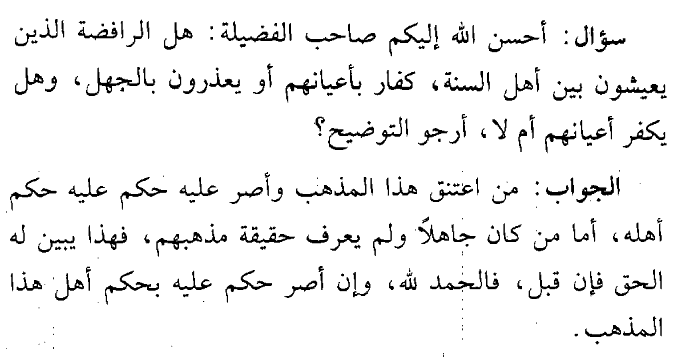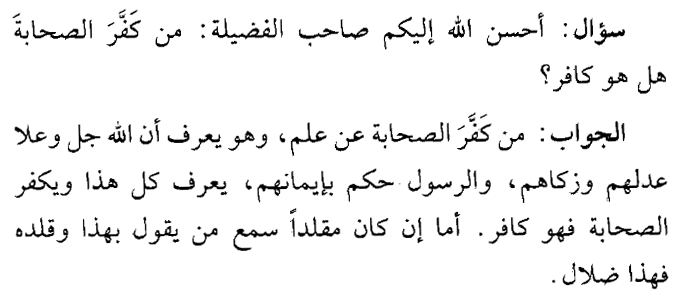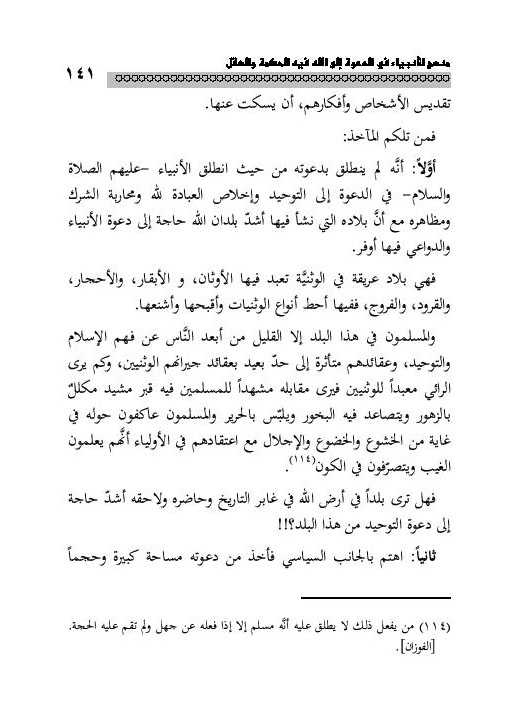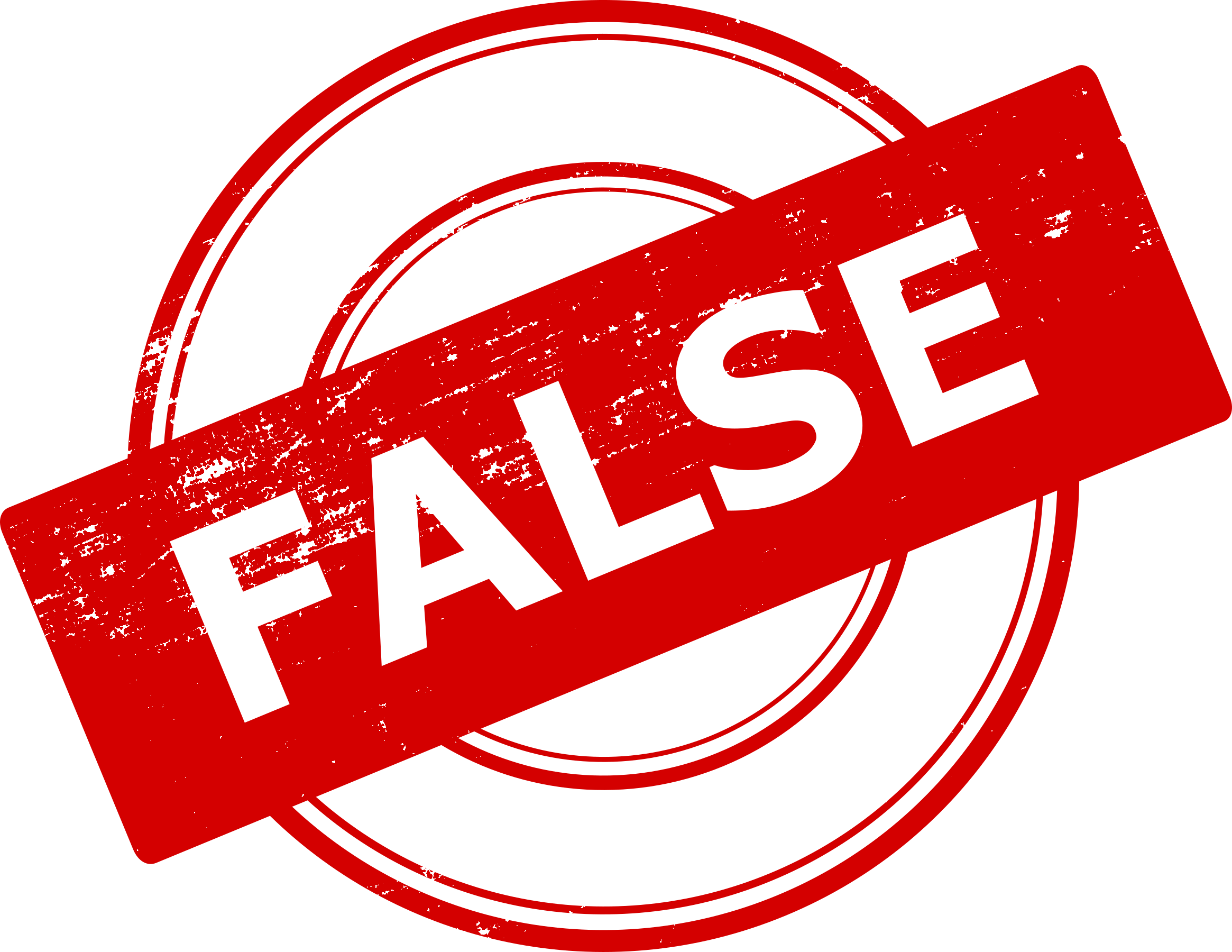In the Name of Allāh, the Ever Merciful, the Bestower of Mercy
In this series of articles we present the statements of the Scholars of Ahl al-Sunnah which clarify and explain the issue of (العذر بالجهل), the excuse of ignorance, and also (المعلوم من الدين بالضرورة), that which is known from the religion by necessity. There is much confusion and speculation about this issue, despite the fact that it is very clear in the speech of the Scholars.
One should also be aware of factions of the Takfiris, Qutbis who allege that the Scholars of Ahl al-Sunnah such as Imaam Ibn Baz, Imaam Ibn Uthaymin, Imaam al-Albaani, Shaykh Abd al-Muhsin al-Abbaad and many other contemporary Scholars are “revisionists,” a charge levelled because these Scholars did not agree to their methodologies and positions (of mass takfir of nations and societies or takfir of certain rulers). Hence, they extended this claim of revisionism beyond the issue of the takfir of the rulers into other issues (such as the excuse of ignorance and that which is known from the religion by necessity) in order to discredit these Scholars and make the people not take from them and instead to drive the people towards the Harakiyyeen and their figureheads.
These Qutbis and Takfiris are ignorant people, they are pretenders to knowledge, and they employ much deception. Instead of being honest and saying that difference in this issue can be found right through the history of the da’wah of Tawhid in Najd, and varying sayings can be found amongst the Scholars of the da’wah, they opted for their usual trait of deception and lies and tried to attack those Scholars who spoke against their Qutbi da’wah by accusing them of being “revisionists” merely because they held the view of granting the excuse of ignorance in matters of kufr and shirk within certain circumstances. Addressing their falsehood and their conniving in detail is for another place. Here we want to systematically document the sayings of the scholars for the purposes of building a record and at a later time, we will inshaa’Allaah, discuss some of these issues with the purpose of clarification.
Shaykh Salih Al-Fawzan on the Excuse of Ignorance and Barriers To Takfir
This brief audio brief audio comprises a question put to Shaykh al-Fawzaan regarding a person invoking others besides Allaah for that which only Allaah has power and control over.
Shaykh Abd al-Azeez al-Rahijee presents the question:
The questioner says, “Whoever performs shirk, such as (a person) calling upon other than Allaah for example, for a cure to an illness (or ill person), so do we say “He is a mushrik” or do we say, “His action is shirk” (with the knowledge) that he says “Laa ilaaha ilallaah” and he fast and makes pilgrimage.
Shaykh Saalih al-Fawzaan answers:
When he does not have an excuse in falling into Shirk then he is a mushrik. As for when he is ignorant, or a muqallid (blind-follower of others), or he makes an interpretation he considers to be correct, then the (affair) is explained to him, then if he disobeys, then the judgement of shirk is made upon him, because his ignorance has now ceased.
The Shaykh affirms that a person may have an excuse, when he is ignorant or blindly following others thinking he is guided, or makes a faulty interpretation (ta’weel) he deems to be correct. So here the Shaykh said this one is to be advised and corrected. This statement should be read with many other statements of the Shaykh and other Mashaayikh which collectively inform us that what is considered (المعلوم من الدين بالضرورة) “that which is known from the religion by necessity” is not a fixed affair, rather it changes from place to place and time to time, and it cannot be used absolutely to reject the other principle of (العذر بالجهل) “the excuse of ignorance” which is amongst the barriers to takfir.
Shaykh Salih Al-Fawzan on Takfir of the Raafidah (1)
The Shaykh was asked:
أحسن الله إليكم صاحب الفضيلة: يقول: هل الرافضة كفار، وهل يُفرق بين علمائهم وعامتهمفي ذلك؟
May Allah be benevolent to possessor of excellence, he (the questioner) says: Are the Rafidah disbelievers and is to be distinguished between their scholars and general-folk in that regard?
The Shaykh answered:
القاعدة أن كلَّ من دعا غير الله أو ذبح لغير الله أو عمل أي عبادة لغير الله فإنه كافر سواء كانمن الرافضة و غيرهم ، من الرافضة و غيرهم . مَن عَبَدَ غير الله بأي نوع من أنواع العبادة فإنهكافر و كذلك من زعم أنّ أحدًا يجب إتباعه من غير الرسول صلى الله عليه وسلم فإنه كافر منالرافضة و من غيرهم. الرافضة يرون أنّ لأئمتهم منزلة أعلى مرتبة من الرسل و أن أئمتهم لايخطئون و أنهم معصومون ، معصومون لا يخطئون ، و أن لهم الحق في أن يحللوا ما أرادواو يحرموا ما أرادوا، أليس هذا أعظم الكفر و العياذ بالله. هذا عندهم في كتبهم ما هو بخفي،وعندهم أمور كثيرة غير ذلك
The principle is that whoever invoked those besides Allaah or sacrificed to other than Allaah or performed any action of worship for other than Allaah, then he is a disbeliever whether he is from the Raafidah or other than them, from the Raafidah or other than them.
Whoever worships other than Allaah with any of the types of worship, then he is a disbeliever and likewise whoever claims that it is obligatory to follow one besides the Messenger (sallallaahu alayhi wasallam), then he is a disbeliever, from amongst the Raafidah or other than them.
The Raafidah consider their imaams to have a higher status than the Messenger, and that their imaams do not err, that they are infallible, they do not errr. And that they have the right to declare lawful what they wish and declare unlawful what they wish. Is this not the greatest disbelief and refuge is with Allaah. This is found with them in their books, this is not hidden, and they have many affairs besides that.
The Questioner said:
يقول: وهل يُفَرَّق بين علمائهم وعامتهم في ذلك؟
He (the questioner) says: Is to be distinguished between their scholars and general-folk in that regard?
The Shaykh replied:
علماؤهم أشد، لأنهم يعرفون أن هذا باطل وأخذوه، لا شك في كفرهم، أما عوامهم فإذا أقيمتعليهم الحجة و أصروا يكفرون، أما ما لم تقم عليهم الحجة فهؤلاء أهل ضلال و لا يكفرون
Their scholars are more severe, because they know that this is falsehood and they adopted it, there is no doubt about their disbelief. As for their common-folk, if the proof is established against them and then they persist, they disbelieve. As for when the proof is not established, then they are people of misguidance and they do not disbelieve.
Reference: At-Ta’leeq al-Mukhtasar alaa al-Qaseedah al-Nooniyyah (3/1342)
Three clear points are taken from the above fatwa: a) Not everyone who falls into kufr or shirk automatically becomes a kafir or mushrik, b) there are situations in which the one falling into kufr and shirk may be excused – from those who ascribe to Islaam – such as ignorance, blind-following, faulty interpretation (ta’weel) and the likes, c) judging upon a specific individual requires presence of conditions and absence of barriers (to takfir) and this is what is meant by “establishing the proof”.
The Shaykh does have other speech that suggests the excuse of ignorance does not apply (in matters treated as “known by necessity” or “through conveyance of the Qur’an” etc.), however the intent here is to show that this view has been held by the Shaykh (and that there is differing about it between the Scholars) and this is a silencing of the Haddaadiyyah who are using this issue to ascribe Irjaa’ to many of the Salafi Scholars who affirm the excuse of ignorance and they include Scholars of Tawhid from Najd in what has passed and likewise the contemporary Scholars, al-Albani, Ibn al-Uthaymin, Abdul-Muhsin al-Abbaad and so on.
Shaykh Salih Al-Fawzan on Takfir of the Raafidah (2)
In the Shaykh’s workAt-Ta’leeq al-Mukhtasar alaa al-Qaseedah al-Nooniyyah (3/1329-1330):

Question: May Allah be benevolent to you, possessor of excellence, are the Raafidah who live amongst Ahl al-Sunnah disbelievers as individuals or are they excused due to ignorance? And are they declared disbelievers specifically (in person) or not? I wish for clarification.
Answer: Whoever adopts this madhhab and persists upon it he is judged with the judgement upon the group (as a whole). As for the one who is ignorant and does not know the reality of their madhhab, then the truth is explained to such as one, if he accepts, then all praise is due to Allaah and if he persists, he is judged with the (same) judgement of the people of this madhhab.
The Shaykh does have other speech that suggests the excuse of ignorance does not apply (in matters treated as “known by necessity” or “through conveyance of the Qur’an” etc.), however the intent here is to show that this view has been held by the Shaykh (and that there is differing about it between the Scholars) and this is a silencing of the Haddaadiyyah who are using this issue to ascribe Irjaa’ to many of the Salafi Scholars who affirm the excuse of ignorance and they include Scholars of Tawhid from Najd in what has passed and likewise the contemporary Scholars, al-Albani, Ibn al-Uthaymin, Abdul-Muhsin al-Abbaad and so on.
Shaykh Salih Al-Fawzan on Takfir of the Raafidah (3)
In the Shaykh’s workAt-Ta’leeq al-Mukhtasar alaa al-Qaseedah al-Nooniyyah (3/1333):

Question: May Allah be benevolent to you, possessor of excellence, whoever declares the Companions to be disbelievers, is he a disbeliever?
Answer: Whoever declares the Companions to be a disbeliever out of knowledge and he knows that Allaah, the Mighty and Majestic has established their integrity and has commended them and that the Messenger judged with (affirmation of) their faith, he knows all of this and declares the Companions to be disbelievers, then he is a disbeliever. As for when he is blind-follower (in that), he heard one who said it and blindly-followed him, this is misguidance.
The Shaykh does have other speech that suggests the excuse of ignorance does not apply (in matters treated as “known by necessity” or “through conveyance of the Qur’an” etc.), however the intent here is to show that this view has been held by the Shaykh (and that there is differing about it between the Scholars) and this is a silencing of the Haddaadiyyah who are using this issue to ascribe Irjaa’ to many of the Salafi Scholars who affirm the excuse of ignorance and they include Scholars of Tawhid from Najd in what has passed and likewise the contemporary Scholars, al-Albani, Ibn al-Uthaymin, Abdul-Muhsin al-Abbaad and so on.
Shaykh Salih al-Fawzan’s Comment on Shaykh Rabee Regarding Those Falling into Shirk From the Ignorant Muslims
Shaykh Saalih al-Fawzaan reviewed the book of Shaykh Rabee’, “Manhaj al-Anbiyaa Fee al-Da’wah Ilallaah” and made a remark upon a statement of Shaykh Rabee’ where he was speaking about ignorant people falling into Shirk (such as in places like India), having been affected by the Mushriks. Here is the page:

Shaykh Rabee explains that in these lands (where many of these politicians emerge with their political da’wah) the people are steeped in Shirk, and the majority of the Muslims are far away from understanding Islam and Tawheed. That they are affected in their beliefs by the mushriks whom they have been living with, and you will see Muslims, just like the mushriks in their lands, having their own idols (tombs), covered in silk, decorated with flowers and burning incense, flocking around it with humility, awe, veneration, alongside their belief that the Awliyaa know the unseen and control the creation. Upon this Shaykh Saalih al-Fawzaan commented:
Whoever does this is not to be labelled a Muslim unless when he does this out of ignorance and the proof has not been established against him.
The Shaykh does have other speech that suggests the excuse of ignorance does not apply (in matters treated as “known by necessity” or “through conveyance of the Qur’an” etc.), however the intent here is to show that this view has been held by the Shaykh (and that there is differing about it between the Scholars) and this is a silencing of the Haddaadiyyah who are using this issue to ascribe Irjaa’ to many of the Salafi Scholars who affirm the excuse of ignorance and they include Scholars of Tawhid from Najd in what has passed and likewise the contemporary Scholars, al-Albani, Ibn al-Uthaymin, Abdul-Muhsin al-Abbaad and so on.
These Haddaadiyyah have now openly started speaking against Scholars such Ibn Taymiyyah, Abd al-Razzaaq al-Afeefee, Ibn Baz in whose statements there can be found what amounts to the excuse of ignorance for those falling into Shirk.
Shaykh Salih Al-Fawzan on Takfir of Those Who Worship the Righteous
Question: Esteemed Shaykh, this questioner says: The one who went astray in the topic of intercession and worshipped the righteous due to a doubt which occurred to him, can he be prayed over (with the funeral prayer)?
Answer: If he persists upon this after he has been conveyed to and prohibited from that, then prayer is not performed over him. As for when it has not been conveyed to him, then he is prayed over, because the falsehood of what he is upon has not been conveyed to him. Yes, whilst he ascribes to Islam, says “Laa ilaaha illallaah Muhammad Rasoolullaah”, however he fell into what he fell into due to ignorance (whose nature) has not been explained to him. Yes.
Comment: This is powerful refutation of the misguided, evil Haddaadiyyah who accuse the Salafi scholars of Irjaa’ because they afford the excuse of ignorance in matters of Shirk and claim that to affirm Islaam for a person who falls into Shirk out of ignorance without the proof being established upon him is the religion of al-Jahm bin Safwaan and Daawood bin Jarjees. In the above answer, Shaykh al-Fawzan affirms that such a person is prayed over. These people (Haddadis and Takfiri Extremists) employ this issue in which scholars have differences as a means of kindling tribulation and engineering the accusation of al-Irjaa’ against Ahl al-Sunnah. For a detailed refutation of these misguided evil Innovators which include factions from the followers of Yahya al-Hajuri, refer to this book:
mukhtasar-hajuriShaykh Ibn Baz on Takfir on the Excuse of Ignorance
The Shaykh (rahimahullaah) was asked the following question:
س :إن رأيت أحداً يدعو صاحب القبر ويستغيث به , فهو مصاب بالشرك فهل أدعوه على أنهمسلم , أم أدعوه على أنه مشرك , إذا أردت أن أدعوه إلى الله عز وجل , وأن أبين له ؟
Question: If I see someone invoking the (dead) in the grave, seeking rescue from him, then has fallen into shirk, shall I call him (to the truth) on the basis that he is a Muslim or shall I call him on the basis that he is a Mushrik if I wanted to call him to Allaah, the Mighty and Majestic, and explain to him?
ج: ادعه بعبارة أخرى , لا هذه ولا هذه , قل له : يا فلان يا عبدالله عملك هذا الذي فعلته شرك , وليس عبادة . هو عمل المشركين الجاهلين , عمل قريش وأشباه قريش ؛ لأن هنا مانعاً منتكفيره ؛ ولأن فيه تنفيره , أول ما تدعوه ؛ ولأن تكفير المعين غير العمل الذي هو شرك , فالعملشرك , ولا يكون العامل مشركاً , فقد يكون المانع من تكفيره جهله أو عدم بصيرته على حد قولالعلماء. وأيضاً في دعوته بالشرك تنفير , فتدعوه باسمه , ثم تبين له أن هذا العمل شرك .
Answer: Call him through another expression, neither this (that he is Muslim) and neither that (that he is a Mushrik), say to him, “O So and so, servant of Allaah, this action of yours which you have done is shirk, it is not worship, it is the action of the ignorant mushriks, the action of the Quraysh and the likes of Quraysh, because there is a barrier to the takfir of such a one and (takfir of him) would cause to him to flee (from the truth) when you call him.
And also because making takfir of an individuad is (a matter) other than the action which is shirk, the action is shirk, but the one who performs it does not become a Mushrik because there could a barrier to his takfir, his ignorance, or his lack of insight in the definition of the scholars. And also in calling through the label of shirk (calling him a Mushrik) is turning him away, so you call him by his name, then you explain to him that this action is shirk.
س : ما الراجح في تكفير المعين ؟
Question: What is the stronger view regarding takfir of a specific person?
ج: إذا قامت عليه الأدلة والحجة الدالة على كفره , ووضح له السبيل ثم أصر فهو كافر. لكنبعض العلماء يرى أن من وقعت عنده بعض الأشياء الشركية وقد يكون ملبساً عليه وقد يكونجاهلاً , ولا يعرف الحقيقة فلا يكفره ,حتى يبين له ويرشده إلى أن هذا كفر وضلال , وأن هذاعمل المشركين الأولين , وإذا أصر بعد البيان يحكم عليه بكفر معين
Answer: When the evidences and proof are established over him which indicate his kufr, and the path has been made clear to him and he persists, then he is a disbeliever. However, some of the scholars hold that whoever falls into some of the affairs of shirk and he may be confused or may be ignorant and does not know the reality, then they do not make takfir of him until it is explained to him and guides him to (the realization) that this is disbelief and misguidance, and that this is the action of the first mushriks. And if he persists after the clarification, he is judged to be a disbeliever (through this disbelief).
Benefits from the above:
- Gentleness and wisdom in da’wah in calling others to the truth
- Explaining the difference between the act and the doer, the act can be shirk but it is not binding that the doer is a mushrik
- Explanation of some of the barriers to the judgement of takfir of an individual such as ignorance, lack of insight, or being confused, deceived (by others).
- The Shaykh mentioned that there are some scholars who hold the excuse of ignorance making establishment of the proof to be a condition (of takfir) [and this view is held by Ibn Taymiyyah, Ibn al-Qayyim, the Imaams of the Da’wah and others] alongside the fact that Ibn Baz in other places expresses the view that there is no excuse of ignorance in foundational matters of Tawhid and the likes, and despite this, Shaykh Bin Baz does not revile those who hold there is excuse of ignorance in these affairs.











